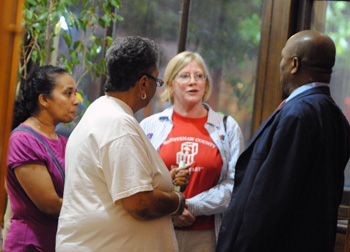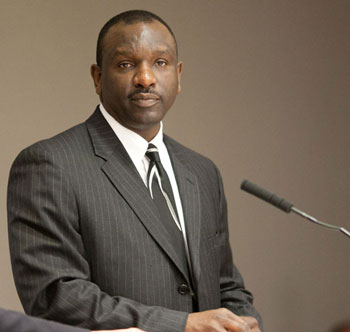Washtenaw County board of commissioners meeting (Sept. 21, 2011): County administrator Verna McDaniel and the county’s finance staff formally presented the two-year general fund budget on Sept. 21, showing how the administration proposes to balance the 2012-2013 budget with a mix of labor concessions, fee increases and funding cuts. Previously, an estimated $17.5 million deficit had been projected for that two-year period.

County commissioner Ronnie Peterson, right, talks with supporters of the Washtenaw Head Start program. (Photos by the writer.)
Although the budget calls for a net loss of 32.22 full-time-equivalent jobs, most of those positions are either already vacant or will be handled through retirements, McDaniel said. One significant retirement was recognized during the meeting: Donna Sabourin, executive director of the county’s community support & treatment services (CSTS) department, who’s worked for the county for 20 years. Commissioners awarded her a resolution of appreciation, and also gave final approval to the CSTS budget for the coming year.
But the meeting’s main focus was the proposed general fund budget, which was discussed at length and will be the topic of most board meetings and working sessions at least through November. The county budget is based on a calendar year, from Jan. 1 through Dec. 31, and is developed in two-year cycles.
Among the recommended cuts is a reduction of $1.2 million to local nonprofits and other agencies. For example, funding for the Humane Society of Huron Valley’s contract is proposed to drop from $500,000 in 2011 to $250,000 in 2012 and 2013. The Delonis Center homeless shelter’s funding could decline from $160,000 to $25,000.
The budget also calls for the county to relinquish its status as the federal “grantee” for the Head Start program in Washtenaw County, which would trigger a process to find a replacement entity. The county has administered the program for 46 years. About a dozen Head Start supporters showed up to Wednesday’s meeting, and urged commissioners to continue support for the program.
Though commissioners had several questions and comments about the 2012-2013 budget, several of them expressed even more concern for what’s on the horizon: Projected deficits of $11.6 million in 2014 and $14.7 million in 2015.
Board chair Conan Smith characterized the 2012-2013 budget as a recommendation that’s “ripe for public discussion at this point.” Everything is still on the table, he said. The board is expected to take up the topic again at its Oct. 5 meeting, and a public hearing on the budget is set for Oct. 19. The target date for approving the budget is Nov. 16.
There was no vote taken on the 2012-2013 budget directly, but the board took action on several other budget-related items. Among them, commissioners gave final approval to levy two taxes: for (1) services for indigent veterans; and (2) economic development and agriculture.
The board also passed a resolution in support of developing a regional transportation authority, after a failed attempt to postpone the vote. The resolution is a prelude to a Sept. 30 summit with Detroit and the counties of Wayne, Oakland, Macomb and St. Clair, which will focus on region transit issues.
Two issues of note did not come before the board as expected. A proposed reorganization of county administration was pulled from the agenda at the start of the meeting. It would have replaced the deputy administrator position by giving additional responsibilities to four managers, paying them annual stipends of $15,000 each. The stipends were a sticking point – during public commentary, AFSCME Local 2733 president Caryette Fenner objected to the timing of that pay, in light of recent labor concessions made by employees.
And not on the agenda was an anticipated proposal by the Washtenaw County Road Commission, which was discussed by the board at its Sept. 8 working session. The road commission is presenting a request for a countywide millage to help pay for road repair. It’s a tax that the county board could impose without seeking voter approval. The plan was subsequently submitted to the county clerk on Friday, and could be addressed at the board’s Oct. 5 meeting. [Full Story]






